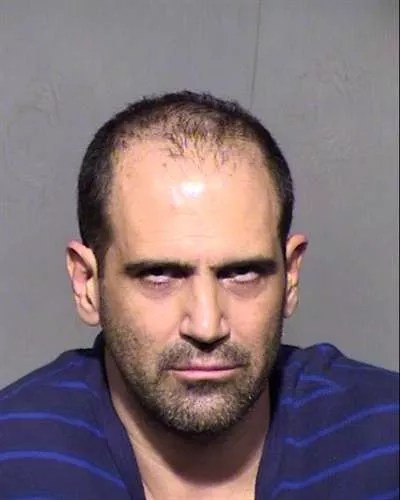
Maricopa County Sheriff’s Office

Audio By Carbonatix

A Mesa trader of bitcoins, known to undercover agents as Morpheus Titania, was convicted by federal jury this week.
BTC Bitcoin via Flickr
A federal jury this week convicted the Mesa bitcoin trader known to undercover government agents as Morpheus Titania on five counts of money laundering.
Known to his mother as Thomas Mario Costanzo, he faces sentencing in June after jurors agreed that federal agents, posing as cocaine and heroin dealers, caught him offering to help them wash $164,000 in U.S. legal tender with the cryptocurrency.
Costanzo faces five years and a $250,000 fine for each of the five counts, according to a statement released by the U.S. Attorney’s Office in Arizona. The Justice Department also said it could seize the bitcoin from the transaction.
“The evidence at trial also showed that Costanzo used bitcoin to purchase drugs from others and that he provided bitcoin to individuals who were buying drugs via the internet,” the Justice Department release said.

Thomas Mario Costanzo, a.k.a. Morpheus Titania.
Maricopa County Sheriff’s Office
Costanzo’s conviction comes a year after feds raided his house and arrested him, and four months after the government dropped its case against his high-profile co-defendant, the Tempe brain scientist and vocal gun-rights activist Peter Steinmetz.
It was a tale of two transcripts.
One, from a meeting between Steinmetz and the agent posing as a Russian buyer, went like this:
“So, you’d be okay if you know the product is heroin?” the agent asked Steinmetz.
“Uh, no, absolutely not,” Steinmetz told him. “In fact, we can’t even discuss this any further.”
“Really?”
“Yep.”
“Seriously?”
“Yeah, sorry,” Steinmetz said. “We can’t do any more deals together.”
Prosecutors moved to dismiss their case in November. It became a rallying cry in certain circles of government heavy-handedness.
Things went differently for Costanzo.
On March 20, 2015, the government recorded Costanzo telling an undercover sting agent that when you deposit money the “radar goes off, the bells go off. It’s like you’re in the casino.”
Then he told the agent the government “can go kiss my ass.”
Undercover: “I haven’t figured out how to get them off my back yet, but actually, that’s why I try to with the cash.”
Costanzo: “Well, you know what? Bitcoin is the way to do it, because guess what?
Now there’s no income, so …”
On October 7, 2015, the government recorded this interaction:
Undercover: “Um, you know we’re – we do business together and…”
Costanzo: “Right.”
Undercover: “And we told ya what, uh, what that’s all about.”
Costanzo: “Right.”
Undercover: “Well, um…”
Costanzo: “Well the thing is I don’t wanna know.”
Undercover: “Yeah.”
Costanzo: “You know what I mean? I know but I don’t wanna know.”
Undercover: “Yeah. I get ya. I hear ya.”
Costanzo: “With this type of business you get a lot, you know, there’s a lot of people that are on the edge … And I walk the edge, too, but it’s like I’m not – it’s like I don’t wanna know a lot of things. You know?”
Later the agent asked Costanzo for advice “for somebody like me who’s, um, who’s using bitcoins to make sure that what I’m doing doesn’t get out there.”
Costanzo told him, “Well, you know, I mean, dealin’ with me is one way.”
Undercover: “Yeah?”
Costanzo: “ ‘Cause I don’t say anything to anybody.”
Undercover: “Right.”
Costanzo: “I don’t give a shit.”
Undercover: “That’s what Sergei said.”
Costanzo: “Um, and that’s – but that’s – that’s why you’re paying me.”
The jury believed the government, and Uncle Sam brought the hammer down on Costanzo.
The investigation involved agents from the Internal Revenue Service Criminal Investigation, the Drug Enforcement Administration, the U.S. Immigration and Customs Enforcement Homeland Security Investigations, and the Scottsdale Police Department, with assistance from the Maricopa County Sheriff’s Office and the United States Postal Inspection Service.
The jury heard testimony from 10 federal agents.
Government prosecutors went to trial with 168 exhibits with which to build their case. Evidence included undercover recordings, text messages, money orders, photos, transaction charts, telegrams, and more.